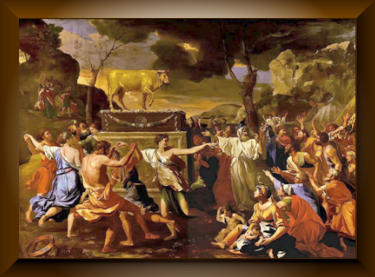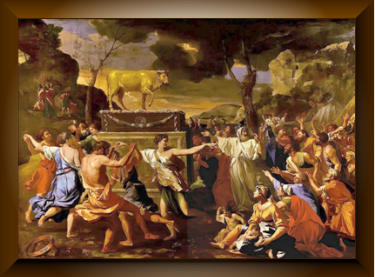Sensuality and Spirituality
It
seems
odd
that
sensuality
and
spirituality
are
often
confused,
since
they
are
opposites.
However,
if
Satan
can
disguise
himself
as
angel
of
light
(2
Cor.
11:14),
it
is
not
really
too
much
to
think
that
sensuality
could
masquerade
as
spirituality.
So, how does this mistake happen?
First,
sensuality
in
the
form
of
sexuality
was
a
common
religious
expression
in
the
pagan
world.
Indeed,
it
was
one
of
the
great
attractions
of
idolatry
that
it
encouraged
or
accommodated
sexual
immorality.
In
the
episode
of
Judah
unknowingly
impregnating
his
daughter-in-law,
the
words
for
“harlot”
(
zanah
)
and
“temple
prostitute”
(
qadesh
)
are
used
interchangeably
(Gen.
38:15,21).
Also,
Israel’s
idolatry
is
often
described
as
“playing
the
harlot.”
This
has
a
two-fold
meaning.
Not
only
is
it
a
metaphorical
reference
to
Jehovah
as
a
husband
against
whom
his
wife,
Israel,
commits
adultery
by
worshipping
false
gods
(cf.
Hos.
1:2),
but
doing
so
literally
involved
the
Israelites
sexually
with
the
devotees
of
these
false
gods
(Num.
25:1-9;
1
Cor.
10:8).
Immorality
was
often
used
to
serve
pagan
religion.
The
Bible made immorality truly immoral.
Yet,
pagan
religion
had
an
even
more
broadly
sensual
appeal.
For
instance,
when
Moses
came
down
from
Mount
Sinai
with
the
Ten
Commandments,
the
Israelites
were
worshipping
a
golden
calf
(Ex.
32).
It
is
a
measure
of
the
sensual
appeal
of
idolatry
that
the
text
says
“…
the
people
sat
down
to
eat
and
to
drink,
and
rose
up
to
play”
(vs.
6).
Idolatry
often
involved
the
satisfaction
of
the
fleshly
appetite (cf. Num. 25:2; 1 Cor. 8:10). In short, idolatry was
fun!
Idolatry
stimulated
the
physical
senses.
It
gave
its
worshippers
an
object
of
worship
which
they
could
see
and
feel,
in
contrast
to
the
Israelite
worship
of
an
invisible
God.
Thus,
Jehovah
had
to
warn
the
Israelites
not
to
be
so
frustrated
by
the
fact
that
they
saw
no
“form”
at
Mount
Sinai
that
they
were
tempted
to
make
images (Deut. 4:15,16).
Pagan
worship
could
be
a
revelrous
affair,
with
raucous
singing,
instrumental
music,
dancing,
and
drinking.
It
says
much
about
the
sensual
nature
of
idol-worship
that,
when
Joshua
said
the
noise
coming
from
Israel’s
camp
was
“the
sound
of
war,”
Moses
identified
it
as
the
“sound
of
singing”
(Ex.
32:17,18).
They
found
the
Israelites
dancing
and
“out
of
control”
(Ex.
32:17-19,25).
Elijah’s
simple,
sedate
prayer
on
Mount
Carmel
contrasts
starkly
with
the
crying,
leaping,
and
raving of Baal and the Asherah’s false prophets about their altar (1 Kgs. 18:25-29).
Worship
under
the
Law
of
Moses
permitted
no
carnality
like
that
found
in
pagan
worship,
but
it
did
allow
more
physicality
(cf.
Heb.
9:10).
It
had
feast
days,
and
animal
sacrifices
were
eaten
by
worshippers
(Deut.
12:27).
It
also
had
dancing
and
instrumental
music
(Psa.
150:4).
Perhaps
such
worship
never
got
more
physical
than
it
did
when
David
brought
up
the
ark
with
shouting,
trumpets,
and
himself “dancing before the Lord with all his might” (2 Sam. 6:12-23).
Yet,
New
Testament
worship
is
dramatically
different.
It
is
the
kind
of
simple,
decent,
and
orderly
worship
which
allows
for
the
cultivation
of
the
spirit
(1
Cor.
14:40).
In
it
there
is
nothing
which
fosters,
and
caters
to,
sensuality.
There
are
no
eating
(1
Cor.
11:34),
instrumental
music
(Eph.
5:18,19),
dancing,
or
sexual
expressions
designed to satisfy the flesh.
The
carnal-minded
find
it
boring
and
seek
sensual
stimulations
which
pass
themselves
off
as
heightened
spiritual
experiences.
They
are
simply
recapitulating
the
ancient
carnal
approaches
they
should
reject
for
truly
spiritual
worship
in
Christ.
They
foolishly
deceive
themselves
by
misidentifying
artificially-induced
and
momentary
feelings
of
sensuality
as
“spirituality,”
though
they
are
nothing
more
than poor, delusional mimicry and mockery of it.
“But
an
hour
is
coming,
and
now
is,
when
the
true
worshipers
shall
worship
the
Father
in
spirit
and
truth;
for
such
people
the
Father
seeks
to
be
His
worshipers.
God
is
spirit,
and
those
who
worship
Him
must
worship
in
spirit and truth.”
(Jn. 4:23,24, NASB)








Sensuality and Spirituality
It
seems
odd
that
sensuality
and
spirituality
are
often
confused,
since
they
are
opposites.
However,
if
Satan
can
disguise
himself
as
angel
of
light
(2
Cor.
11:14),
it
is
not
really
too
much
to
think
that
sensuality
could
masquerade
as
spirituality. So, how does this mistake happen?
First,
sensuality
in
the
form
of
sexuality
was
a
common
religious
expression
in
the
pagan
world.
Indeed,
it
was
one
of
the
great
attractions
of
idolatry
that
it
encouraged
or
accommodated
sexual
immorality.
In
the
episode
of
Judah
unknowingly
impregnating
his
daughter-in-law,
the
words
for
“harlot”
(
zanah
)
and
“temple
prostitute”
(
qadesh
)
are
used
interchangeably
(Gen.
38:15,21).
Also,
Israel’s
idolatry
is
often
described
as
“playing
the
harlot.”
This
has
a
two-fold
meaning.
Not
only
is
it
a
metaphorical
reference
to
Jehovah
as
a
husband
against
whom
his
wife,
Israel,
commits
adultery
by
worshipping
false
gods
(cf.
Hos.
1:2),
but
doing
so
literally
involved
the
Israelites
sexually
with
the
devotees
of
these
false
gods
(Num.
25:1-9;
1
Cor.
10:8).
Immorality
was
often
used
to
serve
pagan
religion.
The
Bible
made
immorality
truly
immoral.
Yet,
pagan
religion
had
an
even
more
broadly
sensual
appeal.
For
instance,
when
Moses
came
down
from
Mount
Sinai
with
the
Ten
Commandments,
the
Israelites
were
worshipping
a
golden
calf
(Ex.
32).
It
is
a
measure
of
the
sensual
appeal
of
idolatry
that
the
text
says
“…
the
people
sat
down
to
eat
and
to
drink,
and
rose
up
to
play”
(vs.
6).
Idolatry
often
involved
the
satisfaction
of
the
fleshly
appetite
(cf.
Num.
25:2; 1 Cor. 8:10). In short, idolatry was
fun!
Idolatry
stimulated
the
physical
senses.
It
gave
its
worshippers
an
object
of
worship
which
they
could
see
and
feel,
in
contrast
to
the
Israelite
worship
of
an
invisible
God.
Thus,
Jehovah
had
to
warn
the
Israelites
not
to
be
so
frustrated
by
the
fact
that
they
saw
no
“form”
at
Mount
Sinai
that they were tempted to make images (Deut. 4:15,16).
Pagan
worship
could
be
a
revelrous
affair,
with
raucous
singing,
instrumental
music,
dancing,
and
drinking.
It
says
much
about
the
sensual
nature
of
idol-worship
that,
when
Joshua
said
the
noise
coming
from
Israel’s
camp
was
“the
sound
of
war,”
Moses
identified
it
as
the
“sound
of
singing”
(Ex.
32:17,18).
They
found
the
Israelites
dancing
and
“out
of
control”
(Ex.
32:17-19,25).
Elijah’s
simple,
sedate
prayer
on
Mount
Carmel
contrasts
starkly
with
the
crying,
leaping,
and
raving
of
Baal
and
the
Asherah’s
false
prophets
about
their
altar
(1
Kgs.
18:25-29).
Worship
under
the
Law
of
Moses
permitted
no
carnality
like
that
found
in
pagan
worship,
but
it
did
allow
more
physicality
(cf.
Heb.
9:10).
It
had
feast
days,
and
animal
sacrifices
were
eaten
by
worshippers
(Deut.
12:27).
It
also
had
dancing
and
instrumental
music
(Psa.
150:4).
Perhaps
such
worship
never
got
more
physical
than
it
did
when
David
brought
up
the
ark
with
shouting,
trumpets,
and
himself
“dancing before the Lord with all his might” (2 Sam. 6:12-23).
Yet,
New
Testament
worship
is
dramatically
different.
It
is
the
kind
of
simple,
decent,
and
orderly
worship
which
allows
for
the
cultivation
of
the
spirit
(1
Cor.
14:40).
In
it
there
is
nothing
which
fosters,
and
caters
to,
sensuality.
There
are
no
eating
(1
Cor.
11:34),
instrumental
music
(Eph.
5:18,19),
dancing,
or
sexual
expressions designed to satisfy the flesh.
The
carnal-minded
find
it
boring
and
seek
sensual
stimulations
which
pass
themselves
off
as
heightened
spiritual
experiences.
They
are
simply
recapitulating
the
ancient
carnal
approaches
they
should
reject
for
truly
spiritual
worship
in
Christ.
They
foolishly
deceive
themselves
by
misidentifying
artificially-induced
and
momentary
feelings
of
sensuality
as
“spirituality,”
though
they
are
nothing
more
than
poor, delusional mimicry and mockery of it.
“But
an
hour
is
coming,
and
now
is,
when
the
true
worshipers
shall
worship
the
Father
in
spirit
and
truth;
for
such
people
the
Father
seeks
to
be
His
worshipers.
God
is
spirit,
and
those
who
worship Him must worship in spirit and truth.”
(Jn. 4:23,24, NASB)







